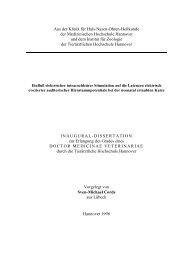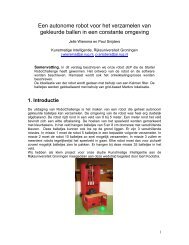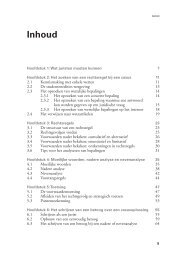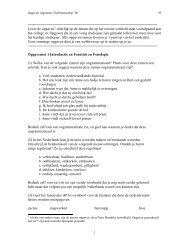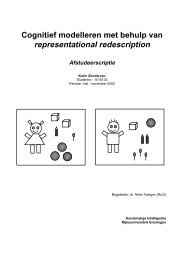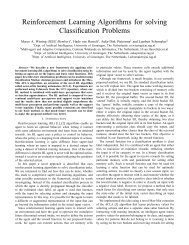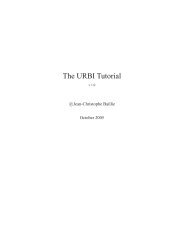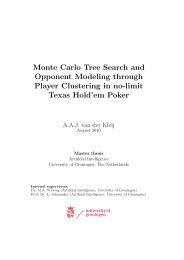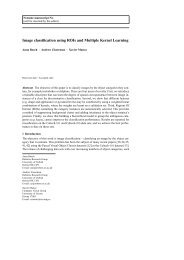Presuppositions in Spoken Discourse
Presuppositions in Spoken Discourse
Presuppositions in Spoken Discourse
You also want an ePaper? Increase the reach of your titles
YUMPU automatically turns print PDFs into web optimized ePapers that Google loves.
Chapter 5<br />
perspective tells us how complex the resolution task was for a real discourse<br />
participant when <strong>in</strong>terpret<strong>in</strong>g a presuppositional expression.<br />
5.2.1 Hearer-new or hearer-known from the perspective of the speaker?<br />
Factives <strong>in</strong> the corpus were a trigger type that tended to <strong>in</strong>duce presuppositions<br />
that have to be accommodated. The factive examples were reexam<strong>in</strong>ed, pay<strong>in</strong>g<br />
particular attention to the context <strong>in</strong> which the presupposed <strong>in</strong>formation was used<br />
and how hearers reacted. Each example was categorized accord<strong>in</strong>g to whether or<br />
not it seemed as if the speaker believed the presupposed <strong>in</strong>formation was known to<br />
the hearer, maybe known to the hearer, maybe new to the hearer, or certa<strong>in</strong>ly new<br />
to the hearer, look<strong>in</strong>g for the k<strong>in</strong>d of evidence outl<strong>in</strong>ed above. The results are<br />
summarized <strong>in</strong> Table 7.<br />
112<br />
category known<br />
maybe<br />
known<br />
maybe<br />
new<br />
new<br />
number 15 (18%) 12 (15%) 7 (9%) 47 (58%)<br />
Table 7 <strong>in</strong>formation status from the perspective of the speaker <strong>in</strong> the corpus of the 81<br />
examples of accommodation<br />
The <strong>in</strong>terest<strong>in</strong>g result is that <strong>in</strong> 47 examples, mak<strong>in</strong>g up 58% of the entire sample,<br />
the speaker seems to believe that the presupposed <strong>in</strong>formation is new to the hearer,<br />
while only <strong>in</strong> 9 examples is it fairly clear that the speaker believes the <strong>in</strong>formation is<br />
shared. Thus, the most frequent function of factive presuppositions <strong>in</strong> the corpus is<br />
to communicate hearer-new <strong>in</strong>formation.<br />
What did the evidence look like that suggested that speakers <strong>in</strong>tended to use<br />
presupposed <strong>in</strong>formation to communicate hearer-new <strong>in</strong>formation? One common<br />
clue was that the presupposition was foregrounded by be<strong>in</strong>g an essential part of a<br />
story the speaker was tell<strong>in</strong>g.<br />
(12) factive, triggered p: the tremendous number of claims aga<strong>in</strong>st the railway<br />
companies were people whose f<strong>in</strong>gers had been caught <strong>in</strong> doors (1-9 215 C)<br />
Speaker C: *when I* worked on the railways these many years ago .I was . work<strong>in</strong>g<br />
<strong>in</strong> the claims department . at Pretona Station Warm<strong>in</strong>gton as office boy<br />
for a short time - and . one NOTICED that the . tremendous number of<br />
claims aga<strong>in</strong>st the railway - companies were people whose . f<strong>in</strong>gers had<br />
been [sk] caught <strong>in</strong> doors as the porters had slammed them -.<br />
Speaker A: Really. Oh my *goodness.*<br />
In this example the speaker is tell<strong>in</strong>g a story and while some of the <strong>in</strong>formation <strong>in</strong><br />
the narration may be hearer-known, e.g. that Speaker C once worked for the<br />
railroad, the presupposition is the ma<strong>in</strong> po<strong>in</strong>t of the story and is clearly believed to<br />
be hearer-new. We also see from Speaker A’s reaction that the <strong>in</strong>formation was<br />
hearer-new. Length was mentioned above as clue to <strong>in</strong>formativeness. Here the<br />
complement of the factive that forms the basis of the presupposition is very long,<br />
and this would also seem to be evidence that it is unlikely that all the presupposed<br />
<strong>in</strong>formation could be known. Note also that because the presupposition is the ma<strong>in</strong>



